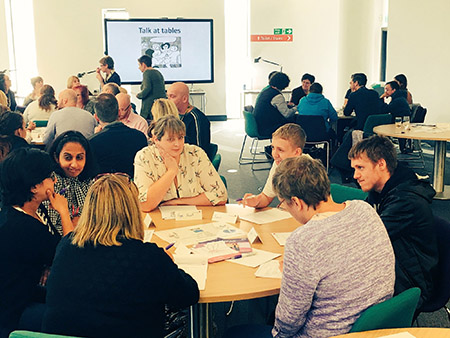Researchers, participants and policymakers discuss how to raise awareness of the Human Papillomavirus (HPV) among minority communities
 An Edinburgh Napier study into Human papillomavirus (HPV) awareness and vaccination progressed by holding an inclusive discussion session on 11 October. The event focussed on raising awareness of HPV among young people with learning difficulties and those from Black and Minority Ethnic (BME) communities.
An Edinburgh Napier study into Human papillomavirus (HPV) awareness and vaccination progressed by holding an inclusive discussion session on 11 October. The event focussed on raising awareness of HPV among young people with learning difficulties and those from Black and Minority Ethnic (BME) communities.
A collaborative forum attempted to go beyond a presentation of findings and included table-top discussions between researchers, the study’s participants, practitioners, and policymakers.
In particular, the discussions addressed:
- how to engage young people in the HPV vaccination programme
- how to raise awareness of HPV and the HPV vaccination across Scotland
- training/education issues for staff and communities
This inclusive format ensured that research findings can now be augmented with practical solutions offered by the research participants themselves.
Recommendations that emerged from the HPV engagement event included:
- Put HPV information online in social media like snapchat, WhatsApp
- Design/create WartsApp
- Design comic strip to explain infection /HPV
- Attend to the needs of refugees/migrants who may not know about HPV
- General campaigns bypass specific cultures - need for targeted campaigns
- Offer HPV information at college in student unions, counselling services
- Put up easy read posters about HPV in college
- Train people who work with young people on HPV - make a LearnPro
The collaborative nature of the forum received positive feedback from both research participants and policymakers:
“Roundtable discussion with diverse professionals with no distinction between professionals and the public”
“Good to see how research works”
“Clear ideas for some actions to take back to work”
“Events like this help dissipating taboo around sexual health in young people”
Organisations represented at the discussion included Edinburgh City Council, Edinburgh College, Robert Gordon University, MEHIS, NHS Lothian, Frae Fife, NHS Health Scotland, People First, RE-EM, and the University of Edinburgh.